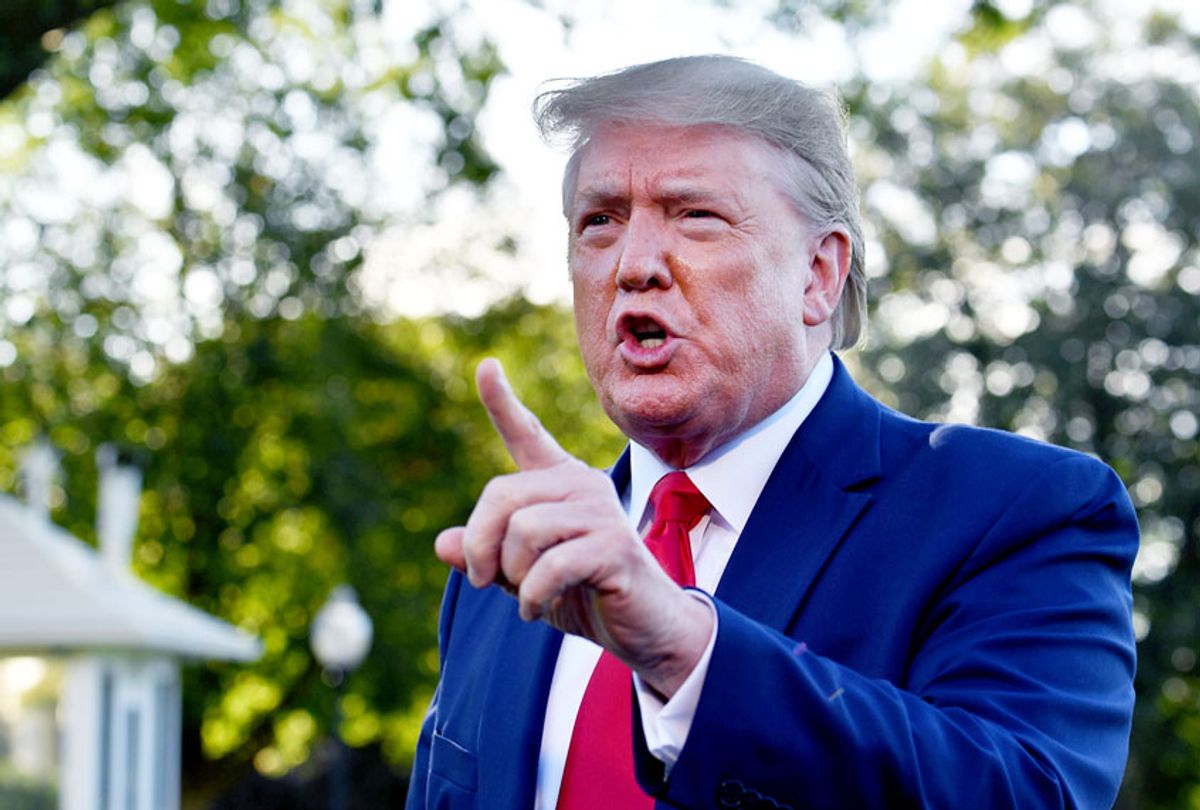Trump's rise as a political outsider has been variously attributed to discontent with elites, a populist appeal, or his celebrity status. Yet a new psychological study that surveyed cultural views of thousands of people concluded that one's support for Trump is directly correlated to the extent with which one endorses stereotypically toxic "masculine" traits.
In other words, if you want to understand how politics has changed, you should start by studying masculinity.
The psychological study, which was published on Monday in the journal Proceedings of the National Academy of Sciences of the United States of America, was titled "Hegemonic masculinity predicts 2016 and 2020 voting and candidate evaluations." The authors point to the concept of "hegemonic masculinity" as a major factor in Trump's political success.
As Dr. Theresa Vescio, a co-author who teaches psychology at Penn State University, told Inverse, hegemonic masculinity is "the idealized and typically racialized form of masculinity in a culture."
Vescio and her co-author — a graduate student at Penn State named Nathaniel Schermerhorn — write in their article that while conducting seven studies involving more than 2,000 participants, they learned that both men and women's "endorsement" of hegemonic masculinity predicted support for Trump — more so than other factors like antiestablishment sentiment, anti-elitist sentiment, nativist populism, or even sexism, racism, homophobia or xenophobia. This remained true even after the results were controlled for party affiliation.
"Trump strategically used rhetoric in both his 2016 presidential campaign and during his presidency that evoked elements of hegemonic masculinity and attempted to position him as the 'ideal man,'" Schermerhorn wrote to Salon. Schermerhorn cited as examples the fact that Trump was perceived as being tough, having a high amount of power and status and lacking personality traits associated with femininity. Trump reinforced these impressions by giving emasculating nicknames to political opponents — for instance, referring to then-former Vice President Joe Biden as "Sleepy Joe," then-Senate Minority Leader Chuck Schumer as "Crying Chuck Schumer" and California Rep. Adam Schiff as "Little Adam Schiff."
"Importantly, he was also able to disparage women and engage in complete misogyny without losing support from his base — from the leaked Access Hollywood video to his comments about Megyn Kelly among many other instances," Schermerhorn added. "Most men – including Trump – cannot live up to the ideals of hegemonic masculinity, but he was able to talk about himself in relation to others (men and women) that helped to characterize him as masculine."
Because hegemonic masculinity is "the culturally exalted form of masculinity in a given culture at a given time," Schermerhorn argued that it is inevitable that some people outside the groups it would naturally benefit — in the case of modern America, straight white men — would wind up endorsing it. "And to keep others endorsing it, there is a 'carrot and stick' type process where certain rewards and benefits are extended to those who may be complicit in upholding these standards of masculinity," Schermerhorn wrote. "For example, gay men might adopt misogynistic attitudes and behaviors in order to gain higher status in a culture that is built on a hierarchy of masculinities."
Although Vescio and Schermerhorn conducted their study before Biden defeated Trump in the 2020 election and egged on his supporters to riot at the Capitol, Schermerhorn told Salon — after emphasizing "we don't have any data that can examine the endorsement of hegemonic masculinity and the incidents that occurred after the 2020 election" — that the response was consistent with their findings.
"Success (and winning) is central to the current construction of hegemonic masculinity and so losing the election is a direct assault on Trump's embodiment of masculinity — especially losing to a Democratic ticket that ran on a platform that would upend current gender, race, and class-based status quos," Schermerhorn explained.
This is not the first study to link Trump's political success to perceptions about masculinity. In October a study in the journal Personality and Social Psychology Bulletin revealed that "men who are likely to doubt their masculinity may support aggressive policies, politicians, and parties, possibly as a means of affirming their manhood." The paper, which was co-authored by Dr. Eric D. Knowles and graduate student Sarah DiMuccio of New York University, rooted their conclusions in precarious manhood theory, or the idea that men "are expected to actively maintain their reputations as 'real men'" and alter their behavior accordingly.
"Lots of previous research suggests that the GOP is the more stereotypically masculine—and thus aggressive—of the two major American political parties," Knowles wrote to Salon. "Consequently, we felt justified in predicting that insecure males would seek to affirm their manhood by supporting Republicans generally — just as they did in the 2018 House elections."
He added that Trump displayed these traits to an even more pronounced degree than the average Republican politician, however, citing instances of Trump "going on Dr. Oz to talk about his testosterone levels, sparring with [Florida Sen.] Marco Rubio about the size of his penis, exhorting his crowds to beat up hecklers, and supporting 'tough' foreign and domestic policies."
Although their study also preceded the 2020 election and its aftermath, Knowles told Salon that "not giving in and not giving up — even when one should — is a textbook attribute of traditional American masculinity. Losing is seen as sign of weakness, and admitting you lost is too." He argued that this helped explain why Trump could not handle being defeated and "the same goes for those of his supporters who were drawn to him out of precarious masculinity."
He added, "We haven't studied extreme groups like the Proud Boys, but I don't think it's a stretch that lots of them might feel a bit insecure about their manhood as well."



Shares